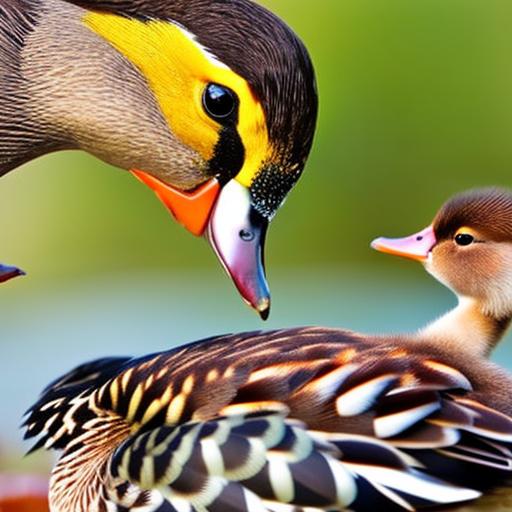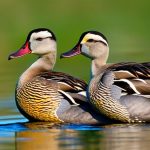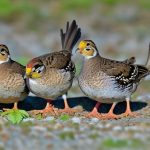Have you ever wandered down to your local pond, a bag of old bread in tote, ready to share a snack with the charming ducks that call it home? You’re certainly not alone; who can resist those eager beaks and waddling walks? Many of us cherish moments like these.
However, before we toss our doughy offerings into the water, there’s something important we need to chew over. Despite our heart being in the right place, offering bread to ducks is akin to serving them junk food.
And believe me—as someone who’s dedicated countless hours tending to my own feathered friends—I’ve learned this lesson up close and personal.
This deep dive into duck dining habits isn’t just about getting scholarly; it’s about sharing what I’ve discovered during my muddy-boots journey as a duck keeper with folks who care just as much as I do.
Our web-footed buddies flourish on diets full of all the goodies they’d naturally scavenge—like bugs and plants—not whatever was left from yesterday’s lunchbox!
So let’s embark on this guide together—as partners in pond-side snacking—and learn all about nutritious nibbles that’ll make any duck do a happy tail shake without doing any damage.
These tips are surefire ways to ensure mealtime at the pond is both joyous and healthful for our quacky companions. So friends, grab your notebooks (or smartphones) ’cause it’s time we made every bite count for our delightful ducky pals!
The Harmful Effects of Feeding Ducks Bread
Feeding ducks bread can lead to nutritional deficiencies and contamination of their water and habitat. It’s important to understand the negative impact of this common practice and consider alternative, more nourishing options for feeding ducks.
Nutritional deficiencies
Ducks need various nutrients to stay healthy. Just like you, they can’t live well on junk food. Bread might fill them up, but it lacks the proteins, vitamins, and minerals ducks must have for good health.
If I feed them this way often, their bodies can suffer. They may become weak and sick because they are not getting the right stuff to eat.
Proper nutrition keeps ducks fit and active. It’s like how eating your veggies makes you strong! Think of each duck meal as a chance to give them something great – seeds instead of candy or greens rather than chips.
This helps prevent painful malnutrition and ensures they’re happy quackers with all the energy they need to swim and fly.
Feeding bread does more harm than just poor nutrition; it can lead to overgrowth in their bellies too! Imagine feeling bloated all day; that’s what happens when ducks eat too much bread.
Plus, not enough protein is a real problem – it’s like trying to build a house without bricks! Ducks need building blocks from proper food so every feather stays smooth and every webbed foot kicks strong in the water.
Contamination of water and habitat
Feeding ducks bread or unhealthy food can contaminate their water and habitat, causing harm to the ecosystem. Uneaten bread pollutes the water, leading to algae growth that depletes oxygen needed by fish and plants, disrupting the balance of aquatic life.
Moreover, leftover food may attract pests like rats and insects that can pose risks to other wildlife in the area and compromise the cleanliness of the environment. It’s crucial for duck keepers to feed them nutritious options that won’t result in water pollution or disrupt their natural habitat.
Improper feeding practices can lead to an overabundance of nutrients in ponds and lakes, causing a phenomenon called eutrophication. This excess nutrient buildup fuels excessive plant growth which crowds out beneficial vegetation, impacting ducks’ natural food sources and nesting grounds.
Nutritional Requirements of Ducks
Ducks require a balanced diet that includes protein, carbohydrates, fat, vitamins, and minerals to maintain their health and energy levels. Providing them with the right nutrients will help keep them strong and active.
Protein, carbohydrates and fat
Ducks need protein, carbohydrates, and fat for a balanced diet. Ensure they have a mix of these nutrients to keep them healthy and active. Ducks can get proteins from insects, larvae, seeds, and small fish or insects they find in their natural environment.
Carbohydrates are present in grains like wheat berries or oats that you can feed them occasionally for energy. Additionally, ducks require fat which is naturally found in their diet through seeds and certain plants.
To ensure your ducks stay healthy, provide them with a variety of protein-rich foods alongside grains like cracked corn and occasional treats such as frozen peas or lettuce to meet their carbohydrate needs.
Vitamins and minerals
Ducks need vitamins and minerals for good health, just like us. They get these nutrients from their natural diet of insects, plants, and seeds. A balanced duck diet should include Vitamin A for vision and immune function, Vitamin D for calcium absorption, and B vitamins for energy metabolism.
Minerals like calcium help in bone formation and muscle function, while iron supports oxygen transport in the body.
These nutrients can be found in commercial duck food or through feeding them leafy greens like kale or swiss chard which are rich in vitamins A and K. Calcium can be provided by offering crushed eggshells or oyster shells as a supplement to their regular diet.
Recommended Foods for Feeding Ducks
I always recommend feeding ducks with cracked corn, oats, frozen peas, lettuce, and grapes. These foods provide essential nutrients for their overall health and well-being.
Cracked corn
I always offer cracked corn to my ducks. It’s a great source of energy and is easy for them to digest. Cracked corn provides essential carbohydrates and is loved by many duck species.
Ducks tend to gobble it up eagerly, making it a popular choice for feeding these quackers.
Cheerios are another potential food option for ducks, especially if you want an alternative treat. Remember that while cracked corn is beneficial in moderation, it should be just one part of a balanced diet including other nutritious foods like oats, frozen peas, lettuce, and grapes.
Oats
Oats are a great option for nourishing ducks as they offer essential nutrients like fiber, protein, and carbohydrates. These grains can be served dry, soaked in water, or even cooked to provide variety for your feathered friends.
Oats are also an excellent source of energy and can help keep ducks active and healthy. When feeding oats to ducks, it’s important to ensure that the oats are plain and not flavored or sweetened, as added sugars can be harmful to their health.
In addition to being nutritious, oats are a cost-effective option for duck keepers looking to provide wholesome treats for their flock. So when considering what snacks to give your ducks, remember that oats make a quacking good choice!
Frozen peas
Ducks love frozen peas. They provide a good source of nutrition and are easy for ducks to eat. Frozen peas offer carbohydrates, fiber, and essential vitamins for the health of your quackers.
Adding some frozen peas to their diet can help ensure they receive a balanced meal.
When feeding your ducks, be sure to thaw the frozen peas before offering them as a treat. This makes it easier for the ducks to eat and digest. When introducing new foods like frozen peas into their diet, start with small amounts first and observe how they respond.
Lettuce
Lettuce is a fantastic treat for ducks as it’s packed with essential nutrients and hydration. It contains vitamins A, K, and C, which are vital for maintaining the overall health of our quacking friends.
Additionally, its high water content helps keep ducks hydrated throughout the day. When offering lettuce to ducks, remember to wash it thoroughly to remove any pesticides or dirt that could be harmful to their health.
I often chop up some fresh romaine or leafy green lettuce into bite-sized pieces and offer them as tasty duck snacks. This is a great way to add variety to their diet while ensuring they receive the necessary nutrients.
Grapes
Grapes are a delightful treat for ducks and provide essential nutrients like vitamins C and K. These sweet fruits also offer hydration, especially during hot weather. When feeding your ducks grapes, remember to cut them into smaller pieces to prevent choking hazards.
I often use grapes as a special snack during training sessions with my ducks, making it an enjoyable interaction for both of us.
Remember that grapes should be offered in moderation alongside their natural diet to maintain a healthy balance. Incorporating a variety of foods such as cracked corn, oats, frozen peas, and lettuce ensures that my ducks receive the necessary nutrients while enjoying their meals.
Tips for Feeding Ducks
Feed your ducks in moderation to avoid overfeeding and causing health issues. Choose proper feeding locations to prevent contamination of water and habitat. Keep cleanliness and sanitation in mind when feeding ducks to maintain their overall health and well-being.
Feed in moderation
Feeding ducks in moderation is vital for their health. Overfeeding can lead to obesity, malnutrition, and digestive issues. It’s important to provide a balanced diet and not rely solely on one type of food.
Ducks need a variety of nutrients from different sources to stay healthy and active.
Balanced nutrition ensures that ducks get the vitamins, minerals, and proteins they require. Feeding them small portions multiple times a day helps prevent overeating while providing essential nutrients.
Proper feeding locations
I place duck food away from water to avoid contaminants. This helps keep the feeding area clean and safe for ducks. I ensure that the place is dry and free from potential health hazards like mold or pests.
It’s important to maintain a designated feeding zone for ducks, like a grassy area, to prevent overcrowding around food. Providing ample room also encourages natural foraging behavior among ducks.
Water should be nearby but separated from the feeding spot to avoid contamination.
Ducks enjoy clear access to their feed, so I position it in an open space without obstacles. Keeping food out of any high-traffic areas ensures that ducks can eat undisturbed and reduces stress on them.
Cleanliness and sanitation
When feeding ducks, it’s vital to maintain cleanliness and sanitation in their eating areas. This helps prevent the spread of diseases and ensures the well-being of the ducks. Regularly clean feeding locations and remove uneaten food to avoid contamination and attract pests.
Additionally, provide fresh water for drinking and bathing as part of maintaining a healthy environment for your feathery friends.
Duck keepers should prioritize hygiene around duck feeding areas by clearing uneaten food promptly to deter pests. Providing constant access to fresh water is crucial for the health and happiness of our quacking companions!
Foods to Avoid Feeding Ducks
Avoid feeding ducks bread, as it can cause nutritional deficiencies and water contamination. Also, stay away from processed or sugary foods and anything that is moldy or spoiled.
Bread
Feeding ducks bread is harmful, it lacks essential nutrients for their health and can lead to nutritional deficiencies. Bread also contaminates the water and duck habitats, impacting their natural ecosystem.
It’s crucial to understand that ducks need a balanced diet of protein, carbohydrates, fat, vitamins, and minerals; therefore, feeding them bread should be avoided. Instead of bread, consider offering cracked corn or oats as they are healthier options for duck treats.
Providing nutritious alternatives is important to ensure the well-being of our feathered friends.
Processed or sugary foods should be avoided when feeding ducks as they offer little nutritional value and can lead to health issues over time. Moldy or spoiled foods are equally harmful to the ducks’ health and should not be given to them at any cost.
Processed or sugary foods
Having understood the harmful effects of feeding bread to ducks, it is equally important to avoid processed or sugary foods. Ducks should not be fed any form of processed foods such as chips, crackers, or any type of junk food.
Sugary snacks like candy and marshmallows should also be avoided as they offer no nutritional value and can lead to health issues for these waterfowl.
Foods high in sugar can result in a variety of health problems for ducks including obesity, diabetes, and other related complications. In addition to this, processed foods often contain preservatives and additives that are harmful to the digestive systems of ducks.
Moldy or spoiled foods
Moldy or spoiled foods illness and digestive issues aflatoxicosisFeeding ducks appropriate, nutritious treats like cracked corn or frozen peas ensures their dietary needs are met while captivating duck keepers with their delightful antics at feeding time.
Now let’s explore the impact of processed or sugary foods on ducks’ health.
Conclusion
In conclusion, ducks require a nutritious diet for their well-being. Feeding them bread is harmful due to its lack of nutrients and potential harm to their environment. By providing recommended foods like cracked corn, peas, and lettuce, we can ensure a balanced diet for these quackers.
Implementing these feeding tips and avoiding harmful foods can have a significant positive impact on the health of ducks in parks or backyard settings. I encourage you to explore further resources on duck nutrition and take proactive steps in nourishing these delightful waterfowl companions.
FAQs
1. What is the best food to give to backyard ducks?
The best foods for backyard ducks are those that provide proper nutrition, like duck feed alternatives that match their natural diet, and can include homemade duck food recipes.
2. Can I feed bread to park ducks?
No, avoid giving bread to ducks at parks as it’s unhealthy for them; offer healthier options recommended for a waterfowl diet instead.
3. What makes up a healthy diet for ducks?
A healthy diet for ducks includes grains, insects, and greens which ensure they receive the right balance of nutrients they need.
4. Are there any special duck feeding tips I should know about?
Yes, you should always provide clean water with their food and give small amounts so the food doesn’t spoil or attract pests.
5. How often should I be feeding my backyard ducks?
Feed your backyard ducks twice a day with appropriate duck nutrition in mind to maintain their health and happiness.
Meet Walter, the feathered-friend fanatic of Florida! Nestled in the sunshine state, Walter struts through life with his feathered companions, clucking his way to happiness. With a coop that’s fancier than a five-star hotel, he’s the Don Juan of the chicken world. When he’s not teaching his hens to do the cha-cha, you’ll find him in a heated debate with his prized rooster, Sir Clucks-a-Lot. Walter’s poultry passion is no yolk; he’s the sunny-side-up guy you never knew you needed in your flock of friends!




